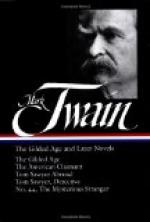Then Barrow communed with himself. “Now what odd shapes the notions of romantic people take. Here’s a young, fellow who’s read in England about cowboys and adventures on the plains. He comes here and buys a cowboy’s suit. Thinks he can play himself on folks for a cowboy, all inexperienced as he is. Now the minute he’s caught in this poor little game, he’s ashamed of it and ready to retire from it. It is that exchange that he has put up as an explanation. It’s rather thin, too thin altogether. Well, he’s young, never been anywhere, knows nothing about the world, sentimental, no doubt. Perhaps it was the natural thing for him to do, but it was a most singular choice, curious freak, altogether.”
Both men were busy with their thoughts for a time, then Tracy heaved a sigh and said,
“Mr. Barrow, the case of that young fellow troubles me.”
“You mean Nat Brady?”
“Yes, Brady, or Baxter, or whatever it was. The old landlord called him by several different names.”
“Oh, yes, he has been very liberal with names for Brady, since Brady fell into arrears for his board. Well, that’s one of his sarcasms—the old man thinks he’s great on sarcasm.”
“Well, what is Brady’s difficulty? What is Brady—who is he?”
“Brady is a tinner. He’s a young journeyman tinner who was getting along all right till he fell sick and lost his job. He was very popular before he lost his job; everybody in the house liked Brady. The old man was rather especially fond of him, but you know that when a man loses his job and loses his ability to support himself and to pay his way as he goes, it makes a great difference in the way people look at him and feel about him.”
“Is that so! Is it so?”
Barrow looked at Tracy in a puzzled way. “Why of course it’s so. Wouldn’t you know that, naturally. Don’t you know that the wounded deer is always attacked and killed by its companions and friends?”
Tracy said to himself, while a chilly and boding discomfort spread itself through his system, “In a republic of deer and men where all are free and equal, misfortune is a crime, and the prosperous gore the unfortunate to death.” Then he said aloud, “Here in the boarding house, if one would have friends and be popular instead of having the cold shoulder turned upon him, he must be prosperous.”
“Yes,” Barrow said, “that is so. It’s their human nature. They do turn against Brady, now that he’s unfortunate, and they don’t like him as well as they did before; but it isn’t because of any lack in Brady—he’s just as he was before, has the same nature and the same impulses, but they— well, Brady is a thorn in their consciences, you see. They know they ought to help him and they’re too stingy to do it, and they’re ashamed of themselves for that, and they ought also to hate themselves on that account, but instead of that they hate Brady because he makes them ashamed of themselves. I say that’s human nature; that occurs everywhere; this boarding house is merely the world in little, it’s the case all over—they’re all alike. In prosperity we are popular; popularity comes easy in that case, but when the other thing comes our friends are pretty likely to turn against us.”




